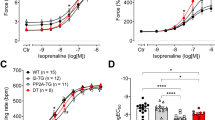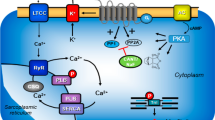Abstract.
Activation of β1-, β2-, β3- and putative β4-adrenoceptors modifies cardiac function. These receptors are usually coupled to Gs protein, but β2- and β3-adrenoceptors could also couple to Gi/o proteins. The mouse heart is used increasingly for studies of genetically disrupted or overexpressed proteins, including β-adrenoceptor subtypes. We therefore investigated in contracting mouse left atria (2 Hz, 37°C) if inactivation of Gi/o proteins with pertussis toxin modifies or uncovers effects mediated through β-adrenoceptor subtypes. The negative inotropic effects of carbachol in atria exposed to catecholamine or high calcium (6.8 mmol/l) were assumed to be mediated through activation of muscarinic receptors coupled to Gi/o. We report conditions under which incubation of left atria with 200 ng/ml pertussis toxin for 24 h nearly abolished the carbachol responses. Although it has been reported that muscarinic receptor-mediated cardiodepression has an obligatory contribution of nitric oxide, the nitric oxide synthase inhibitor N G-monomethyl-l-arginine (0.1–1 mmol/l) did not modify the negative inotropic effects of carbachol, inconsistent with an involvement of nitric oxide. The positive inotropic effects of (–)-noradrenaline and (–)-adrenaline, mediated through β1-adrenoceptors, were not affected by pertussis toxin. (–)-Adrenaline did not cause positive inotropic effects attributable to β2-adrenoceptor-mediation, in the presence of CGP 20712A (300 nmol/l) to block β1-adrenoceptors, in control atria or atria pretreated with pertussis toxin. The positive inotropic effects of (–)-CGP 12177 (1 µmol/l), a compound with agonist activity at the putative β4-adrenoceptor, were unaffected by pertussis toxin. The β3-adrenoceptor-selective agonist BRL 37344 (1 µmol/l), in the presence of (–)-propranolol (200 nmol/l), did not cause positive or negative inotropic effects in control and pertussis toxin-treated atria. In left atria obtained from mice injected with 150 µg/kg i.p. pertussis toxin which abolished carbachol-evoked cardiodepression, the positive inotropic effects of (–)-adrenaline were antagonised by CGP 20712A. The β2-adrenoceptor-selective antagonist ICI 118551 (50 nmol/l) did not cause additional blockade of the effects of high (–)-adrenaline concentrations in the presence of CGP 20712A, ruling out the involvement of β2-adrenoceptors. The results with intraparenteral PTX validate our in vitro PTX method. We conclude that inhibition of murine Gi/o proteins does not alter atrial positive inotropic effects mediated through β1- and putative β4-adrenoceptors and does not reveal functional β2- and β3-adrenoceptors.
Similar content being viewed by others
Author information
Authors and Affiliations
Additional information
Electronic Publication
Rights and permissions
About this article
Cite this article
Oostendorp, J., Kaumann, A. Pertussis toxin suppresses carbachol-evoked cardiodepression but does not modify cardiostimulation mediated through β1- and putative β4-adrenoceptors in mouse left atria: no evidence for β2- and β3-adrenoceptor function. Naunyn-Schmiedeberg's Arch Pharmacol 361, 134–145 (2000). https://doi.org/10.1007/s002109900156
Received:
Accepted:
Issue Date:
DOI: https://doi.org/10.1007/s002109900156




